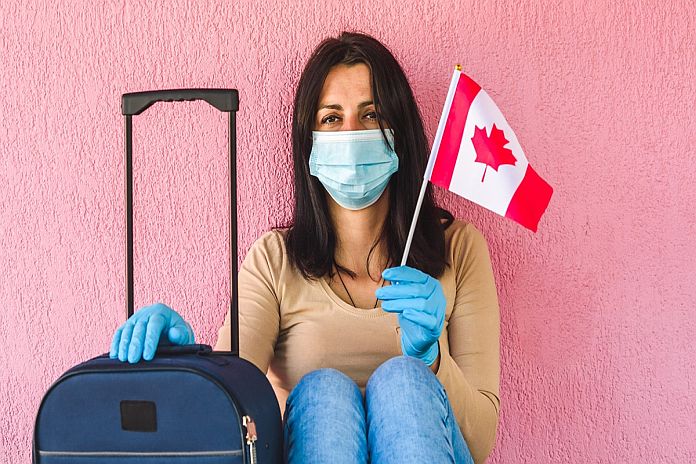By Shelby Thevenot
MONTREAL, Canada, (CIC NEWS) – Days after immigration minister Marco Mendicino announced plans to increase immigration in 2020, Prime Minister Justin Trudeau told the world that the Canadian border would be closed on March 18 [one year ago today] as a public safety measure to prevent the spread of coronavirus.
Initially, the border was just supposed to be closed until June 30, 2020. Although travel restrictions have undergone some changes, they are still in effect. Border crossings are down between 88 percent and 96 percent for land and air travel, respectively. The government currently has no plan for when nor how it will reopen the border.
Up until January, Canada’s immigration levels had taken a huge hit, in part due to travel restrictions. By the end of 2020, only 184,000 new permanent residents had landed in Canada, the lowest level since 1998.
But travel restrictions were not the only measure that would upset immigration levels. Social distancing and other COVID safety measures at home and abroad also affected operations at Immigration, Refugees and Citizenship Canada (IRCC).
The early days
In the beginning, it was generally only Canadians, essential workers, and immediate family members, among others who were exempt from travel restrictions who could travel to Canada. All other travel had to be “non-optional” or “non-discretionary.”
IRCC cancelled all citizenship ceremonies, tests, and retests. In-person permanent residency landing appointments were cancelled for almost a month. Around the world Visa Application Centres were closed, and language tests were cancelled, meaning it was difficult for some to complete the application process for Canadian immigration.
While all these services were put on hold, IRCC extended the time limit for immigration applicants to apply. Those who were affected by service closures could ask IRCC for an extra 90 days to complete their applications.
Approved permanent residents were only exempt if they received their Confirmation of Permanent Residence (COPR) before March 18.
With limited exceptions, all travellers to Canada had to complete a mandatory 14-day quarantine. They would need to arrive with a plan to get food and medicine during their stay, and not put others at risk, especially vulnerable people.
Federal government measures to support immigrants during the pandemic
International students who got their study permits after March 18 were not allowed to come to Canada in the beginning, but the government took the unprecedented step of allowing online study to count toward a Post-Graduation Work Permit (PGWP). As of February, international students can do 100 per cent of their program online, up until December 31, 2021, and still be eligible for the PGWP.
In the fall, Mendicino announced that international students would be exempt if they were going to Designated Learning Institutions that had a COVID-19 readiness plan. On the same day, the minister announced that extended family members could also come to Canada, which meant that the adult children of Canadians could come visit their parents. Also, foreign nationals who wanted to cross the border for compassionate reasons, such as a funeral, were allowed to travel and even break quarantine in certain situations.
The pandemic also forced more of IRCC’s services to go digital. Approved permanent residents can now complete the landing process electronically. Also, Canada now offers both citizenship ceremonies and citizenship tests online.
Vaccines, the second wave, and hotel quarantine
Canada approved the Pfizer-BioNTech vaccine on December 9, after new cases had climbed to unprecedented levels that would continue into the new year. There are now four vaccines approved in Canada, and they are available to anyone who is eligible for them regardless of their citizenship status.
In January, Canada implemented a new mandatory quarantine requirement, where arriving international air travellers would have to stay in a government-approved hotel near one of the four major airports that have been operating throughout the pandemic. All new international arrivals would also need to do a COVID-19 test upon crossing the border.
The ones still left behind
Although Canada continued to accept immigration applications, the government did not exempt the applicants it approved from any country other than the US. This means that people who were approved for permanent residence from any other country need to be exempt under some other measure in order to complete the landing process in Canada.
IRCC said that these approved permanent residents will be able to complete their landing when travel restrictions are lifted, and they will not have to re-apply if their documents expire while travel restrictions are in place.
Immigration said to be “key to economic recovery”
Along with low levels of immigration in 2020, Canada’s population growth also slowed. To make up for it, the Canadian government set the ambitious target of welcoming 401,000 new immigrants in 2021. The first month of this year already started to look like pre-pandemic immigration levels, with nearly 25,000 newcomers landing in Canada.
Canada has also been upping its efforts to admit new permanent residents who are already in Canada. On February 13, Canada invited every single Express Entry candidate who was eligible for the Canadian Experience Class to apply for permanent residence. About 90 percent of the people who are eligible for this program are already in Canada.
Throughout the pandemic, the federal government maintained that immigration will continue to be a priority. Canada is still facing the demographic challenges that it was before the pandemic, an aging labour force, and a declining birth rate. These problems can only be addressed by welcoming high levels of immigrants.
There is no timeline on when the border will re-open and allow immigrants from abroad to easily travel to Canada. However, Trudeau has promised on multiple occasions that everyone in Canada who wants a vaccine will be able to get one by the end of September, or maybe sooner.
This article originally appeared on CIC NEWS on March 18, 2021.





